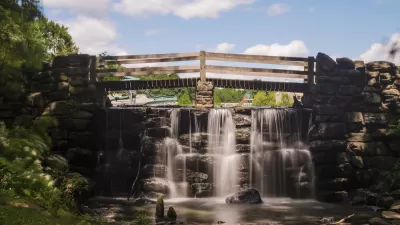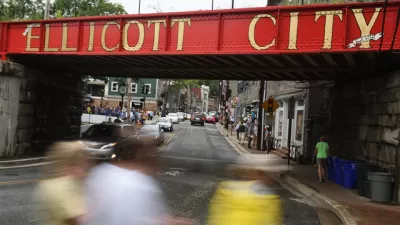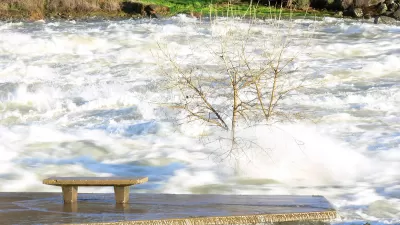The realities of climate change have been on full display in Michigan this summer, and a crusading drain commissioner is pushing for stormwater infrastructure that uses natural features to capture and reuse water during extreme weather.

With memories of massive flooding still fresh from storms this summer, Sarah Grimmer details efforts around the state to increase its stormwater mitigation.
Some in the state are noticing the challenge of stormwater for the first time because the climate in the state is changing. "Since 1986, total annual precipitation across most of Michigan's lower peninsula has increased by more than 10 percent," writes Grimmer.
Now the state and its local and regional planning authorities are facing the challenge of updating its infrastructure—built on old assumptions on how much rain would fall on the state—for the new reality of climate change.
Ingham County Drain Commissioner Patrick Lindemann is cited extensively in the article to describe both the need for new infrastructure, as well as the challenges, like a lack of funding, standing in the way of a more resilient state. Lindemann suggests that instead of simply installing larger drainpipes—a task which many Michigan governments can't afford—a preferable strategy might be to rethink how to handle stormwater altogether.
Instead of funneling excess water in the Great Lakes, Lindemann wants to restore watersheds and create wetlands and ponds. "These projects work to hold rainfall and use it rather than pushing it out," explains Grimmer.
"The drain commissioner's goal is to build around 50 of these projects in Ingham County, he says it will take about 40 to 50 years to get this work done and, in the process, rebuild the county's infrastructure so that it can handle our new environment."
FULL STORY: Massive rainfall events aren't going away in Michigan. Experts say our infrastructure needs to adapt

Planetizen Federal Action Tracker
A weekly monitor of how Trump’s orders and actions are impacting planners and planning in America.

DARTSpace Platform Streamlines Dallas TOD Application Process
The Dallas transit agency hopes a shorter permitting timeline will boost transit-oriented development around rail stations.

Congressman Proposes Bill to Rename DC Metro “Trump Train”
The Make Autorail Great Again Act would withhold federal funding to the system until the Washington Metropolitan Area Transit Authority (WMATA), rebrands as the Washington Metropolitan Authority for Greater Access (WMAGA).

Supreme Court Ruling in Pipeline Case Guts Federal Environmental Law
The decision limits the scope of a federal law that mandates extensive environmental impact reviews of energy, infrastructure, and transportation projects.

Texas State Bills to Defund Dallas Transit Die
DART would have seen a 30% service cut, $230M annual losses had the bills survived.

Bikeshare for the Win: Team Pedals to London Cricket Match, Beats Rivals Stuck in Traffic
While their opponents sat in gridlock, England's national cricket team hopped Lime bikes, riding to a 3-0 victory.
Urban Design for Planners 1: Software Tools
This six-course series explores essential urban design concepts using open source software and equips planners with the tools they need to participate fully in the urban design process.
Planning for Universal Design
Learn the tools for implementing Universal Design in planning regulations.
Roanoke Valley-Alleghany Regional Commission
City of Mt Shasta
City of Camden Redevelopment Agency
City of Astoria
Transportation Research & Education Center (TREC) at Portland State University
US High Speed Rail Association
City of Camden Redevelopment Agency
Municipality of Princeton (NJ)





























